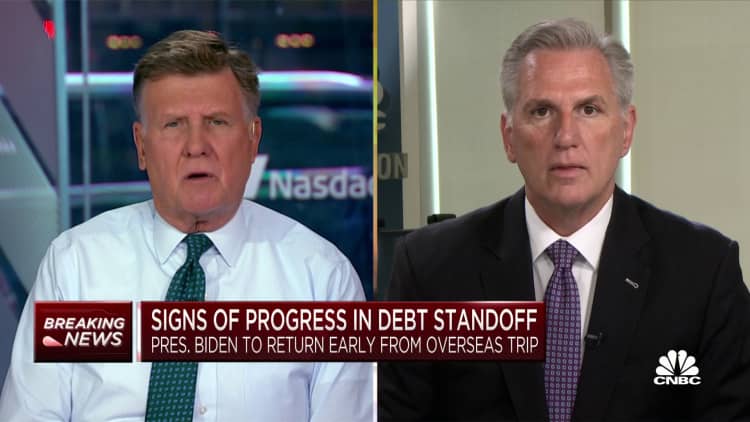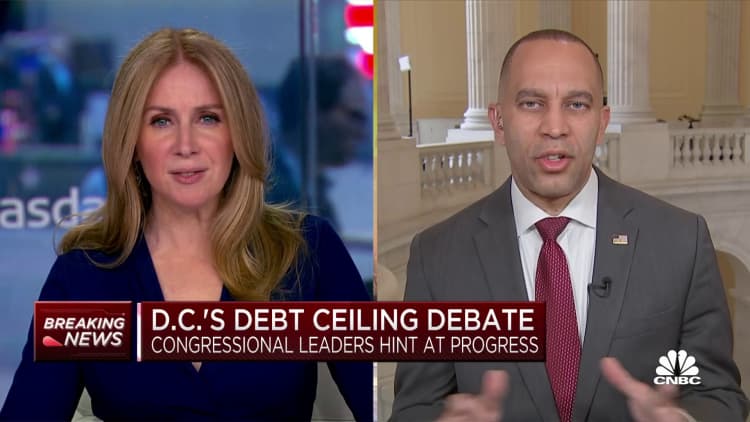
WASHINGTON — House Speaker Kevin McCarthy told CNBC in an interview Wednesday he does not think the U.S. will default on its debt as tense negotiations over the debt ceiling continue.
“I think at the end of the day we do not have a debt default,” McCarthy told CNBC’s “Squawk Box.”
Leaders are running out of time to raise the debt ceiling before a June 1 deadline when the government is set to run out of money. McCarthy met Tuesday with President Joe Biden at the White House alongside the vice president and other top congressional leaders in an attempt to hammer out a deal before the president left for the Group of Seven summit in Japan.
McCarthy refrained from saying Wednesday that he was optimistic about the state of the talks, but said he was encouraged by Biden’s willingness to negotiate. Biden on Tuesday said he would cut short his trip to Asia to further engage in debt limit talks.
“The only thing I’m confident about is now we have a structure to find a way to come to a conclusion,” McCarthy said. “The timeline is very right. But we’re going to make sure we’re in the room and get this done.”
Lifting the debt ceiling is necessary for the government to cover spending commitments already approved by Congress and the president — and prevent default. Doing so does not authorize new spending. But House Republicans have said they will not lift the limit if Biden and lawmakers do not agree to future spending cuts.
McCarthy and House Minority Leader Hakeem Jeffries in separate interviews Wednesday morning on “Squawk Box” agreed that negotiations were moving forward, but the two remained entrenched in their positions.
Jeffries called a Republican request to attach work requirements to federal food benefits a “nonstarter” but said he remains optimistic about negotiations.
“It was a very positive meeting yesterday,” Jeffries said. “It was calm. It was candid in terms of the discussion and I’m optimistic common ground will be found in the next week or two.”

Jeffries noted the last time work requirements were proposed, in the 2018 Farm Bill, Republicans including McCarthy voted against it.
“It’s entirely unreasonable to think that at this particular point in time, in the context of a debt ceiling showdown that has been manufactured, as part of an effort to avoid default, that these types of so-called work requirements can be imposed on the American people,” he said.
McCarthy on the other hand maintained that work requirements were the “responsible” thing to do, and noted that Biden voted in favor of work requirements when he was a senator.
“Work requirements only go to those able-bodied people with no dependents,” McCarthy said. “You could be in school and be waived. You could be looking for a job and be waived. But what we’ve found is with every statistical data is that it helps people get a job, it helps our supply chain, it helps the economy and the individual even stronger, and that’s what we should be doing.”
While Republicans have been pushing for work requirements, Democrats have been asking for revenue-raising mechanisms to be part of the debate. McCarthy said taxes would not be discussed.
“There is not going to be a tax discussion in this debt ceiling,” McCarthy said. “The president admitted that yesterday.”
CNBC Politics
Defaulting on sovereign debt would wreak havoc on the economy and roil global markets. A default on Treasury bonds could throw the U.S. economy into a tailspin. The last time congressional Republicans threatened a default in 2011, Standard & Poor’s downgraded the U.S. credit rating for the first time ever to AA+ from AAA.
The Treasury Department has taken extraordinary steps to keep paying the government’s bills, and expects to be able to avoid a first-ever default at least until early June. Treasury Secretary Janet Yellen warned last week that failure to hike the debt ceiling would cause an “economic catastrophe.”
If the U.S. were to default, gross domestic product would drop 4% and more than 7 million workers would lose their jobs, Moody’s Analytics recently projected. Even a brief default would lead to the loss of 2 million jobs, according to the data.

